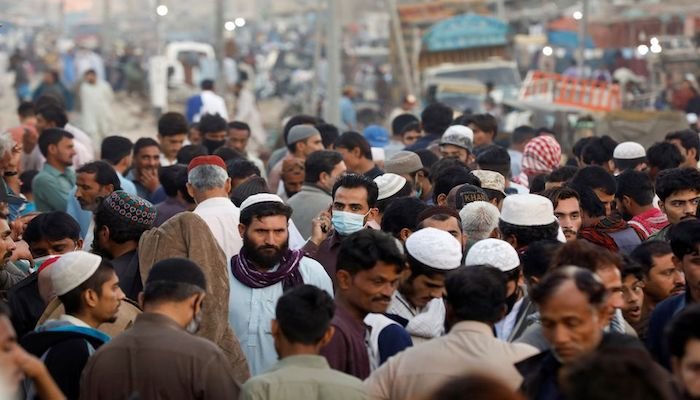
Amid rising Covid-19 cases, Sindh govt imposes lockdown till August 8
The Sindh government on Friday decided to impose an immediate lockdown till August 8 as the province continues to battle the dangerous surge in Covid-19 infections.
The lockdown goes into effect to on Saturday and would impose the following rules:
- Government offices will be closed from next week.
- Those who do not get vaccinated will not get their salary after August 31.
- Vaccination cards of anyone roaming the streets will be checked.
- The export industry will remain open.
- All markets in the province will remain closed, but pharmacies will stay open.
- Inter-city transport will be closed
This was decided in a meeting of the coronavirus task force on Friday, chaired by Sindh Chief Minister Murad Ali Shah, with provincial ministers, medical experts and representatives of the Pakistan Medical Association in attendance.
For the first time, parliamentary leaders of political parties were also invited to the Covid-19 task force meeting. Besides this, the Sindh Rangers director-general was also invited.
Addressing a press conference after the meeting on Friday, CM Murad Ali Shah maintained that it was due to the tough decisions taken by the provincial task force that Sindh was able to tackle the first, second and third waves of Covid-19 relatively better than other provinces.
“But in this fourth wave, the Delta variant is the main concern,” he added.
He noted that Karachi was the most affected city now, saying the virus spread fast in closed spaces and cases would multiply if measures were not taken to curb it.
“Just a month ago, there were an average of 500 cases daily in Sindh by the end of June. And now by July’s end, the number of daily cases has increased to 3,000,” he said.
Shah revealed that after the task force meeting, he had informed federal minister Asad Umar and SAPM Dr Faisal Sultan about its decisions, and “they assured us of helping us in implementing these decisions.”
“This is not a complete lockdown. This is a partial lockdown,” he said, noting that complete lockdown was the one that had been imposed last year on March 20.
The chief minister appealed to the people to help the government successfully implement its decisions, saying “we will move towards reopening” from August 9.
“If you help us, we will be able to contain the spread of this disease. People are asking what will happen after August 8. We have to take measures so that our hospital facilities are not choked.”
Citing increased travelling during Eid holidays, Shah said the Covid-19 positivity ratio which was 1pc at many places had now jumped to 6pc in 4-5 days. “It is necessary to take effective measures to break this virus chain,” he stressed.
He shared a three-pronged approach to contain the virus:
1- Prevent its spread by social distancing, following SOPs and imposing lockdown
2- Improving hospital facilities. “We need to make more interventions to ease the burden on hospitals,” he said.
3- Vaccination. “In this lockdown, we will ensure that vaccination does not suffer in its wake,” Shah added.
A day earlier, the federal government on Thursday set August 31 as the deadline for anti-Covid vaccination, following which only vaccinated staff and people would be allowed to enter both public, private sector offices, businesses and high-risk sectors.
“This is being done for you. This is not a punishment but an acknowledgement to make you realize that you play an important role in this society and economy. And we, on a priority basis want that your health is not compromised so that your livelihood continues and economy also continues,” Minister for Planning Development and Special Initiatives Asad Umar said while addressing a press conference.
The federal minister was flanked by Special Assistant to Prime Minister on Health Dr Faisal Sultan.
Asad Umar, who is also Chairman of the National Command and Operation Centre, said that NCOC had already made a decision earlier that unvaccinated people would be barred from travelling in domestic flights from August 1, likewise teachers and staff would also not be allowed to enter educational institutions unvaccinated from this date.
He said that we cannot take risk of children, adding that around 80 per cent of teachers have already been vaccinated.
The minister said the ban would be extended from August 31 on other sectors and places where the risk of coronavirus spread is high due to excessive assembling of people, including the transport sector, markets and public-dealing offices.
“These are all facilities where people visit in bulk and have to get in touch with people there and are exposed to the virus,” he said.
The minister said the drivers, who provide pick and drop facilities to schoolchildren would be required to vaccinate themselves while those travelling on public transport should also follow the deadline.
The students with an age of over 18 years would also have to vaccinate themselves to attend educational institutions while employees of private and public sector entities could not enter their office unvaccinated after August 31.
In addition, people in high-risk areas including hotels, restaurants, marriage halls would also have to get vaccinated in addition to those of law enforcement agencies, banks, NADRA, markets, shopping malls and chain stores.
He expressed the hope that the Pakistani nation would come out of this challenge successfully and would become an example of success among developing nations in dealing with the Covid-19 and also in the anti-coronavirus vaccination drive.
Asad Umar added that the implementation of SOPs was not the only solution, the people needed to be vaccinated as early as possible.
He said that the government had adopted a prudent strategy by striking a balance between controlling coronavirus and allowing economic activity across the country. He stressed that complete lockdowns did not work in India and Bangladesh and had a very negative effect.
The minister said the government had the comprehensive framework and was taking data-based decisions. However, he said there were problems in compliance of coronavirus SoPs all across the country.
The Sindh government, on the other hand, had been mulling a complete lockdown in Karachi as the city’s hospitals are “nearing saturation point”, members from the provincial task force on coronavirus told Geo News on Thursday.
Provincial government officials told Geo News that medical experts within the task force have asked for a complete 14-day lockdown in the city.
“Hospitals are nearing a saturation point with cases in Karachi rising rapidly,” the task force members said, adding that the Sindh government was consulting stakeholders on the imposition of a lockdown.
Representatives of the Pakistan Medical Association have already demanded a complete lockdown across Sindh, the members said.
The task force members said more than 370 patients had been admitted to hospitals across Karachi in just the last two days. “The pressure on oxygen supply is increasing with the influx of patients.”
Businesses will be shut and a complete ban on public movement will be imposed during the lockdown, the task force members said.
On a positive note, the Sindh government’s suggestion to block SIM cards of people who have not been vaccinated seems to be working, with hundreds of people lined up outside Karachi’s vaccination centres, Geo News reported.
Based on the decisions taken in the meeting today, the Sindh government, it seems, has decided that it does not care what the federation says and that the only immediate solution to bring down virus cases was a lockdown.
POSITIVITY RATIO REACHES 7.2%:
The national tally of active Covid-19 cases was recorded as 62,723 on Friday, with 4,537 more people tested positive for the deadly virus and 1,489 people recovered from the disease during the last 24 hours.
86 corona patients have died during the past 24 hours, 82 of whom were under treatment in the hospitals and four of them perished in their respective quarantines or homes, according to the latest update issued by the NCOC.
Most of the deaths occurred in Sindh, followed by Punjab. Out of the total 86 deaths that occurred, 50 of them died were under treatment on ventilators.
There were 3,117 Covid infected patients under treatment in critical condition with 33 of them admitted during the past 24 hours in various Covid dedicated healthcare facilities of the country.
The positivity ratio during the past 24 hours was recorded at 7.23 percent.
The maximum ventilators were occupied in four major cities including Islamabad
37 percent, Lahore 20 percent, Peshawar 18 percent and Karachi 18 percent.
Around 304 ventilators were occupied elsewhere in the country while no Covid affected person was on a ventilator in Balochistan.
Some 58,203 tests were conducted across the country on Thursday, including 20,475 in Sindh, 17,510 in Punjab, 10,091 in Khyber Pakhtunkhwa, 3,484 in Islamabad Capital Territory, 4,689 in Balochistan, 864 in GB, and 1,090 in AJK.
Around 938,843 people have recovered from the disease so far across Pakistan making it a significant count with over 90 percent recovery ratio of the affected patients.
Since the pandemic broke out, a total of 1,024,861 cases were detected that also included the perished, recovered and under treatment Covid-19 patients so far, including AJK 23,819, Balochistan 30,162, GB 8,008, ICT 86,945, KP 143,213, Punjab 355,483 and Sindh 377,231.
About 23,295 deaths were recorded in the country since the eruption of the contagion. Around 5,947 people perished in Sindh, 44 of them died in the hospitals on Thursday.
11,019 people died in Punjab died with 24 deaths occurred in past 24 hours. 20 individuals died in the hospitals and four out of the hospitals.
As many as 4,444 people expired in KP, nine of them died in hospitals on Thursday, 799 individuals died in ICT, two of them died in hospitals on Thursday, 327 people died in Balochistan, one perished in the hospital in the past 24 hours, 137 infected people perished in GB, four of them died in the hospitals in past 24 hours and 622 people in AJK died, two of them succumbed to the deadly virus in the hospitals on Thursday.
A total of 15,936,674 corona tests have been conducted so far, while 639 hospitals are equipped with Covid facilities across the country.
Some 3,575 corona patients were admitted to hospitals.
with additional input from INP, APP


